-
MAGGIE'S PLAN (Rebecca Miller 2015)
REBECCA MILER: MAGGIE'S PLAN (2015)

GRETA GERWIG AND ETHAN HAWKE IN MAGGIE'S PLAN
The independent doormat
Rebecca Miller's sort-of rom-com Maggie's Plan is a bit too into itself and its Manhattan settings, but it has some new things to offer. Miller's turning from drama to comedy. "Vikings" star and former Calvin Klein underwear god Travis Fimmel as a pickle entrepreneur sperm donor (to Grata Gerwig's character). Tragic drama queen Julianne Moore showing how ridiculous and funny she can be as a Danish professor married to Ethan Hawke. (She could as well be Icelandic, with her weird accent and her outfits that might have be on loan from Björk, but that's the point: she's from outer space.) Ethan Hawke for the first time working with a woman director -- and with three women, essentially, since Maggie's Plan is dominated by Georgette (Moore) and Maggie (Gerwig), whom his character, John, gets tossed back and forth between.
The tossing is what bothers me, because Maggie's Plan -- which is as intentionally messy in plot as Maggie herself, a self-reliant, centered young woman with a Quaker background, is organized -- does what too many American rom-coms do today. It loses all sense of narrative structure. And then again, that it winds up where it started out is quite intentional too.
The premise is simple and clear enough. Maggie, wanting to have a child but aware she can't seem to stay with one man more than six months (which, by the way, doesn't quite fit the stable, organized Quaker), looks for a sperm donor (the long-bearded Fimmel). And it's good she calls on a Viking, because all this happens in New York in wintertime -- with a side trip to Quebec for an academic conference. But then she meets John in Washington Square and winds up agreeing to read the manuscript of his novel. She is an administrator at the New School where he is a hottie new teacher. And one thing leads to another, with John's iffy marriage to Georgette derailed by his love affair with Maggie, who falls in love with him as well.
Georgette is an absurdly self-centered academic star herself. The arcane academic specialties of this couple are tossed out for laughs, but they went over my head. ( Something about anthorpology and commodities, for John.) John and Georgette have a couple of noisy, bratty little darlings and an older, grown-up girl who can talk. Wallace Shawn has a one-line appearance, and Bill Hader, who's in touch with his feminine side and delivers lines well, is that rom-com staple, Maggie's longtime pal, with advice.
Jump ahead three years. John and Maggie are married and have their own little girl (what happened to the pickle entrepreneur's Viking's sperm? It got dumped for an early meeting with John). Maggie is so good at organizing things and caring for the three kids, both Georgette and John can pursue their academic work and John can continue with his novel -- except that the novel isn't getting anywhere. And life with Maggie is too perfect. Maggie realizes that John needed to deal with the craziness and self-absorption of Georgette. It kept him from being too absorbed in his work or his novel. We can't really believe in the brilliance of Georgette (only her oddity) or of John, they're just givens. John doesn't sound bright to me. He uses "fuck" a lot, like any ordinary dude.
So Maggie's Plan, the main one, is to get John back with Georgette. And so it turns out that the independent young woman played by Gerwig here is the perfect doormat. As the only stable, responsible partner, that's the role she winds up playing.
I did not find any of this believable, or engaging. Julianne Moore is droll, and Greta Gerwig is, as usual, smooth and natural. Ethan Hawke is glib, but one feels no emotion. I thought of that famous early scene for Hawke in Dead Poets Society where Robin Williams struggles to make his young preppie character learn to emote. It seems he has lost the shyness of that young Hawke but still can't emote. Well over half the movie is devoted to talking about getting Georgette and John back together again. It gets beyond tiresome. But the Lower Manhattan atmosphere and in-jokey stuff about academe make this an original treatment of the kind of confusion of relationships that might be dealt with in a more conventional, less into-itself comedy, like the current Sleeping with Other People. This may be, as they're saying, Rebecca Miller's most successful, widely appealing film, but I liked her less successful ones. This is based on an unpublished novel. Hmmm. . .
Maggie's Plan a longish 96 mins., debuted at Toronto, where Miller apologized for its appearing without a distributor (but isn't that what festivals are for, to find them?). It was also part of the 2015 New York Film Festival, where it was screened for this review. The inclusion in the NYFF Main Slate is explicable given its family resemblance to Noah Baumbach's work and inclusion of Baumbach's girlfriend, together with lots of very natural photography of New York whose realistic color contrasted, not unappealingly, with the gloriously dreamlike Ed Lachman Gotham images of another, much better NYFF 2015 film, Todd Haynes's Carol. Maggie has been picked up by Sony Pictures Classics.
(Release date 20 May 2016. Metacritic rating a fawning, deluded 75%.)
Last edited by Chris Knipp; 05-30-2016 at 01:05 PM.
-
THE TREASURE/COMOARA (Corneliu Ponumboiu 2015)
CORNELIU PORUMBOIU: THE TREASURE/COMOARA (2015)
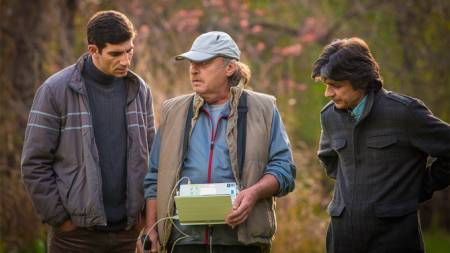
TOMA CUZIN, CORNELIU COZMEI AND ADRIAN PURCARESCU IN THE TREASURE
Digging, finally finding and then (partly) giving away
In the Romanian director Cornelieu Porumboiu's deadpan new film, Adrian (Adrian Purcarescu), who's lost his publishing business and is badly behind in his mortgage payments, lures his neighbor Costi (Toma Cuzin), a real estate worker who's having trouble paying his bills too, into a venture to find treasure he suspects is hidden on inherited property. At first Adrian just says he is strapped for cash and asks to borrow 800 euros. When Costi says no, Adrian explains about the treasure and offers to go halves on whatever they find if he'll put up the money. It's needed for a metal detector. Apparently you can't just buy one in Romania; you have to hire a specialist. To round up the cash, Costi must persuade his wife (Cristina Toma).
"This idea might have made for an amusing half-hour short," Mike D'Anelo commented from Cannes, where The Treasure debuted; " at 89 minutes, it feels extremely shaggy-dog." Indeed, a lot of screen time is devoted to watching two men dig a hole in a garden, with a pretty anticlimactic result. The ending, a sort of punchline, like the finale of Porumboiu's Police, Adjective (NYFF 2009), is perhaps just more peculiar (and vaguely symbolic) than shaggy-dog, but indeed the film feels dragged-out, a long trek to a small payoff.
Like Police, Adjective this new effort from Porumboiu, who made the more self-consciously modernistic When Evening Falls on Bucharest two years ago (NYFF 2013), is a curious combination of the doggedly realistic and the didactic. This time, Porumboliu chooses to scrub out the local color of Police, Adjective, posing characters in front of blank walls or bare ground for his Asian-style static middle-distance shots. The men do dig in real dirt, though, and they have to go pretty deep. As it dragged on, I wondered if the actors were actually doing this digging.
One fellow viewer thought the whole film was a joke; I could not see that, but there is some humor about a boss who insists Cristi must be cheating on his wife because he lies about his arrangements for the metal detector. After the treasure is found -- its exact nature a bit of a surprise, its cashing in full of bureaucratic detail, Costi, who's been reading Robin Hood to his little boy (Nicodim Toma), gives some of his cut away to children in the form of handfuls of valuable jewelry. This odd behavior seems inspired by his son's expectations from Robin Hood and the word "treasure." Much is made of the fact that under remnants of communist law, any valuables found must be shown to police and if determined to be part of the "national heritage," only a third goes to the finders.
When it gets late and the digging goes deeper and deeper with no results and Adrian and Costi doubt that Cornel, the metal detector specialist, knows what he's doing, the three start to quarrel. It's beginning to look as if things might turn homicidal, as in Chaucer's Pardoner's Tale or The Treasure of the Sierra Madre. No such luck. Porumboliu is too humorless and deadpan for that -- and he is moving on, laboriously, to his Robin Hood finale. What it means is anyone's guess. A viewer of Serbo-Croatian origin with whom I spoke after the screening thought it too was a reference to communism -- a longing, perhaps, for less selfish days. The film's obviously opens with a focus on today's economic woes.
There are some ideas hovering around here somewhere, but The Treasure winds up as yet another variation on the minimalist current Romanian filmmaking style, short on entertainment and not long on sense.
The Treasure/Comoara, 89 mins., debuted in the Un Certain Regard section at Cannes May 2015, winning the Certain Talent prize; also shown at well over a dozen other international festivals. Screened for this review as part of the Main Slate of the 2015 New York Film Festival.
Last edited by Chris Knipp; 10-01-2015 at 10:12 AM.
-
RIGHT NOW, WRONG THEN (Hong Sang-soo 2015)
HONG SANG-SOO: RIGHT NOW, WRONG THEN (2015)
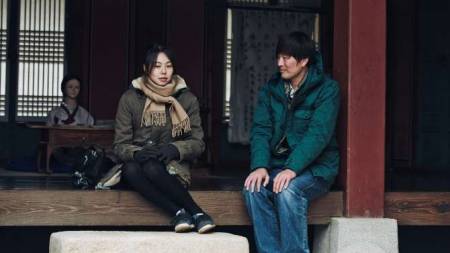
KIM MINHEE AND JUNG JAEYOUNG IN RIGHT NOW, WRONG THEN (FIRST MEETING)
He said, she said? Or she said, he said?
Right Now, Wrong Then, simpler in plot than some of Hong Sang-soo's earlier films, begins with his standard situation of an art film director, an ironic version of himself, not making movies but on a professional jaunt and doing some drinking and womanizing (or flirting, anyway). Ham Chunsu (Jung Jaeyoung, of Hong's 2013 Our Sunhi) has come to Suwon, south of Seoul, to attend a special screening of one of his films and answer questions afterwards. He's a day early. Flirtation and drinking take precedence; the film screening comes in second.
Going to a peaceful pavilion , the historic "Blessing Hall" palace, Ham spots a beautiful young woman, Yoon Heejung (Kim Minhee), sipping banana water. He is immediately attracted and invites her for coffee. She appreciates his attention, thrilled to learn who he is, even though she's never actually seen any of his movies. She's a fledgling artist, and invites Ham to her studio, and then to a cafe where they both get drunk. She remembers she's got a date to spend the evening with a woman she knows who runs a restaurant. They both go there, and get drunker. The next day, the hungover Ham meets the audience at the screening.
More and more Hong is into rhythmic repetition, sometimes to surreal effect, but he varies the forms this repetition takes every time. In his 2011 The Day He Arrives, for instance, which has similar bar scenes, the director protagonist, Seong-jun (Yu Jun-sang), keeps running into the same situations and the same people. In that film, the parallelisms are overlapping. In the 2009 Like You Know It All (FCS 2010) the film is divided into two parts twelve days apart, where similar things happen.
Right Now, Wrong Then resembles Like You Know It All in being divided into equal two halves, with the movie titles coming in the middle to divide them. But this time they are flat-out alternative versions of the same sequence of events I've outlined above. Both versions begin very similarly in the pavilion where Ham and Heejung first meet; then things develop differently. In the first version, Han praises Heejung's painting, but in the second he is more critical. In the first version there is a man at the restaurant who is only seen outside in the second version. In the second version, the drunken Ham takes all his clothes off for two socked strangers at the restaurant; Heejung only learns of this when Ham is with her near her house. She laughs and excuses it and kisses him, saying she will go home and greet her mother and let her go to sleep, then sneak out to spend more time with him, though she never does, and it's cold so he leaves. In the first version, hardly anyone turns up for the next day's screening, and the moderator is, in Ham's vehemently expressed view later, a conceited creep (an idea that has come in earlier films). Ham, still drunk from the night before, gives a wild speech and stomps out. In the second version, the screening is well attended and goes well and people express admiration and gratitude to him outside afterward.
With Nobody's Daughter Haewon (NYFF 2013) Hong presented his story from a woman's point of view. In Right Now, Wrong Then, he may be presenting first the man's then the woman's memory of events -- though which one is which may be debatable, and an irate young French woman with a feminist bent after the NYFF screening complained that this new film is just the celebration of a womanizer. Well, that Han has the repetition of a womanizer is brought up in both the first and second versions of events; on the other hand, unlike some of Hong's films, no sex takes place and Ham's relationship with Heejung seems quite chaste, his declaration that he would like to marry her rather sweet.
Mike D'Angelo says in his review of Hong's 2012 Another Country that "Hong tends to make the same movie over and over." True indeed, but always with variations, naturally. To compare and classify these repetitions with variation would require the kind of careful study an academic researcher might do, and a more precise memory than I can muster now. On Letterboxd D'Angelo calls this new film the "Hong diptych" he's "been waiting for," and calls it "Mulholland Dr. in reverse: grim reality first, wish-fulfillment fantasy second" -- but then he admits he doesn't quite know for sure if the two halves are her memory, and then his; or the reverse. Either way, he finds this one of Hong's most enjoyable films. He's right to want to see it again. There is much to puzzle over this time, though since this is the ninth Hong film in a New York Film Festival and I've seen one or two of his films elsewhere, it's getting harder for me to remember all the different parallel and overlapping story lines. Last year's NYFF Hong film, Hill of Freedom, includes (as I recall) recurrent sequences in a guest house with Ryô Kase that parallel the ones in the pavilion this time. There was a haunting sense of déjà vu even though what happens in the two spaces is quite different. A jaundiced viewer may say the director didn't have enough material and filled up two hours by running the same story twice. But I am a Hongista and am happy to observe the nuances. (See my Hill of Freedom review for links to all my other Hong Sang-soo reviews. Boyd Van Hoeij's enthusiastic review of the new film for Hollywood Reporter provides insights.)
Right Now, Wrong Then / 지금은맞고그때는틀리다, 121 mins., debuted at Locarno Aug. 2015, where it won three prizes, including the Golden Leopard (best picture) and Best Actor. Other festivals, including Vancouver, London and Toronto. It was screened for this review as part of the 2015 New York Film Festival (US premiere, Oct. 9 & 10). US theatrical release beginning 24 June 2016.
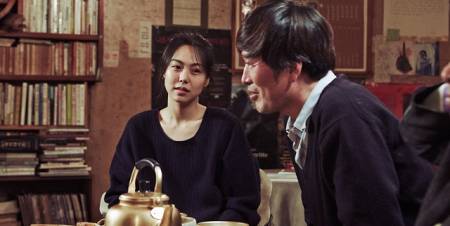
KIM MINHEE AND JUNG JAEYOUNG IN RIGHT NOW, WRONG THEN (IN THE RESTAURANT)
Last edited by Chris Knipp; 06-17-2016 at 12:32 PM.
-
THE MEASURE OF A MAN/LA LOI DU MARCHÉ (Stephane Brizé 2015)
STEPHANE BRIZÉ: THE MEASURE OF A MAN/LA LOI DU MARCHÉ (2015)
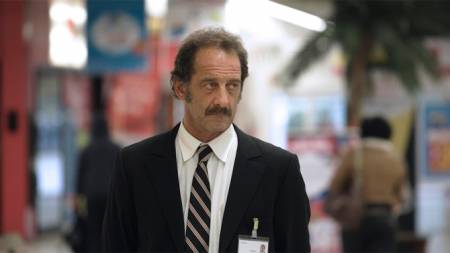
VINCENT LINDON IN THE MEASURE OF A MAN
How much must one compromise to have a job?
This is an issue film and a character study that treads Dardenne brothers territory but without the final uplift. Judging by the other two Stéphane Brizé films I've seen, Not Here to be Loved, about an ultra-dour bailiff (Patrick Chesnais), and Mademoiselle Chambon (with Vincent Lindon and Sandrine Kiberlain), concerning a lonely schoolteacher's brief romance with a married man, Brizé likes his stories a bit down at the mouth. And this is the flaw of his new film, with its rock-solid performance by the always impeccable Lindon that won him the best acting award at Cannes. The film is so unrelentingly grim it leaves you feeling more worn down than enlightened. But its lesson about the moral limits of compromise for a man seeking employment in a down economy is a dose of medicine that can't be pushed aside or forgotten.
Thierry (Vincent Lindon)is a laid off factory heavy equipment operator who's wasted 20 months taking training courses that turn out not to qualify him for a new job. And we see him being advised to take out life insurance; unable to get even near the market rate for his mobile home; informed in a Skype interview that his chances of being hired for a job like his old one are very slim, though not zero. The first part of the film shows us a series of bureaucratic humiliations patiently endured by Thierry, and we're introduced to his wife and son Matthieu, who has cerebral palsy (requiring expensive special care). After all the grim lessons of the heartless "Law of the market" (the French title) of the depressed economy, we suddenly see Thierry in a job unworthy of him -- suited up as a security guy in a big box store. Here the title's second meaning is applied: he must now impose the ruthless law of this market, an internal one, both cruel and kind, based on a surveillance-state system using dozens of cameras to monitor every inch of the store.
Except the first, a cocky young Arab guy who steals a charger for his smart phone, the shoplifters are poor and unfortunate, the climactic one an old man who has pocketed two pieces of red meat to add to his small bag of groceries. By store policy he goes free if he can pay for the meat, but he's spent the last centimes of his monthly dole on the small bag of groceries. But the unkindest cut is what follows: the store spies on its own employees, especially the cashiers, and one of them, a hard working 20-year employee with a drug addict son caught out for hoarding store coupons, commits suicide.
This movie not only lacks final uplift; it contains nothing that's remotely fun. Even dancing lessons Thierry takes are somehow mechanical and sad. But Vincent Lindon embodies his character so well we strongly feel his feelings in the scenes with shoplifters even though he's barely saying anything because another security staff person does most of the talking.
Most of the scenes throughout are improvised, and many feel like simulations, which give a somewhat artificial sense of realism. That's except for Lindon. He owns and fully inhabits every role he plays, even when cast wildly against type in Benoît Jacquot's 1998 School of Flesh as a prissy transvestite. I like what Mike D'Angelo said in his Cannes report on this film for The Dissolve, that Lindon "fairly oozes rugged masculinity." (Except maybe as a transvestite.). And to do that and seem authentic isn't so easy. So three cheers for Lindon's Cannes award . I'll go with Scott Foundas' Variety review: Lindon as Thierry gives us "a veritable master class in understated humanism." This performance is a nice parallel, as others have also said, for Marion Cotillard's in Two Days, One Night. But I'm reserving judgment on this film.
The Measure of a Man/La loi du marché, 93 mins., debuted at Cannes in Competition, wining for Vincent Lindon the Best Actor award, arguably long overdo given the depth of Lindon's many performances. French release AlloCiné pres rating 3.8. A Kino Lorber release. North American Premiere. US theatrical release begins 15 Apr. 2016 NYC (Lincoln Plaza Cinemas, Metrograph).
Last edited by Chris Knipp; 03-12-2016 at 05:29 AM.
-
MY GOLDEN DAYS/TROIS SOUVENIRS DE MA JEUNESSE (Arnaud Desplechin 2015)
ARNAUD DESPLECHIN: MY GOLDEN DAYS/TROIS SOUVENIRS DE MA JEUNESSE (2015)
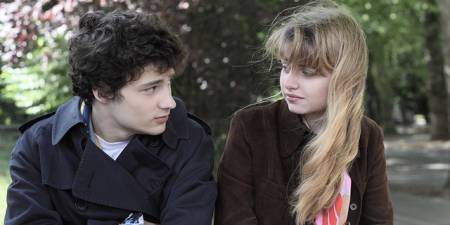
QUENTIN DOLMAIRE AND LOU ROY-LECOLLINET IN MY GOLDEN DAYS
A first love, in its elaborate setting
Though he has reported being energized in making this new film by the idea that it might be considered a "prequel" to his most notable early one, My Sex Life. . . or How I Got into an Argument (1997), it turns out he only keeps a few characters and makes up the rest. The main one is still Paul Dédalus, now an anthropologist, still played, now as a middle aged man, by Matthieu Amalric, who appears relatively briefly as the subject of the frame sequences and narration. Trois souvenirs de ma jeunesse (given the saccharine new title My Golden Days in English) doesn't strictly adhere otherwise to its "source." Desplechin is telling a typically elaborate story here with plenty of characters and three stages of Paul's early life: as a young boy, in early adolescence, and as a lyçée student (Quentin Dolmaire) pursuing a long-lived if fruitless affair (it goes on for years, well beyond the lyçcee into Paul's time at university) with the love of his life, Esther (Lou Roy-Lecollinet). (Esther appears in My Sex Life... embodied by Emmanuelle Devos; neither of the older actors particularly resembles their younger versions.) It's that third (and surely most important?) "souvenir" that we care about. The rest seems elaborate filler. Trois souvenirs, then, goes from complicated and unsatisfying early segments to the simpler and more successful last part -- the latter a classic, if nicely detailed, story of young love.
But we begin with the middle-aged Paul (Amalric), a world-traveller returning to work in France after years abroad, called in for questioning by a venerable French government official (André Dussollier), just as he is about to take up a post at the Quay d'Orsay (the French foreign ministry). There's a problem: that Paul appears to have loaned his identity to someone living in another hemisphere. He has also lived in several far-flung, almost unknown, hence vaguely suspicious places (though they turn out to be explained by his researches as an anthropologist).
The double identity turns out to go back to Paul's early teen years, and an elaborate deal arranged by his father for a brief school trip to Russia, to help Jewish "refuseniks" wanting to get out of the country. I'm not convinced it was worthwhile to enact this episode in so much loving detail.
In a press interview Desplechin describes Ether as "eating up" the film once she arrives on the scene. As a character (and perhaps this is true of the 17-year-old actress, who plays her, Lou Roy-Lecollinet) she is an intriguing combination of timid on the one hand and theatrical and egocentric on the other. She strikes poses, looks into space, showing off her big eyes and pouty lips. (Roy-Lecollinet is striking looking, but Quentin Dolomaire as young Paul, with his porcelain skin and his cheekbones, is prettier.) The best part of the film is the way the Esther-Paul relationship is handled, through its various stages. Once they meet, it is so clear that they are going to be a couple (despite the fact that all the boys desire her and Paul is a lousy "dragueur," date-maker) that it doesn't matter what either of them says or does. And yet for that very reason, what they say an do can be unconventional.
This is early enough in time so that no one has a phone and there is no email. This may not be Desplechin's life, but it's the time when he was this age. They communicate, constantly, by letter, and at one dramatic point Esther, who's several years younger, sends Paul a telegram. It's delivered to him while he's at a university lecture and everybody thinks it's bad news, but it's good news from Esther that she's passed her "bac" exam and gotten her lyçée diploma.
It's true that the on and off love of Paul and Esther isn't treated condescendingly at all, and this seriousness and respect are partly French and partly Desplechin who, no mater how elaborately he handles his storytelling, generally manages to maintain a light touch too.
The subplots work well in the latter parts, notably Paul's relation to a Sorbonne professor of Benin culture (Eve Doe-Bruce), whom he charms into taking him on by saying the other students need a dumb guy like him to feel smart. Esther is wildly unpredictable. Desplechin engagingly depicts their years together, D'Angelo puts it, "as a series of gorgeous fragments, employing his usual arsenal of meta-cinematic gimmicks (split screen, silent-era irises, characters reciting letters directly to the camera) to convey the sense that everything shown is being freshly remembered." She betrays him more than once but it is he who leaves her. I end watching this somewhat over-complex but frequently engaging film wishing somehow it had been framed in a less distracting and irrelevant-seeming way. It's nonetheless a worthy and not untypical panel in the director's oeuvre. His repetition of the Paul character naturally invites comparison with Truffaut, and Amalric/Bonaire with Jean-Pierre Léaud. A typical French review ends by saying "a new Desplechin film is always an event."
My Golden Days/Trois souvenirs de ma jeunesse, 123 mins., debuted at Cannes May 2015 in the Directors Fortnight section, it opened theatrically in France to enthusiastic reviews 20 May (AlloCiné 4.1); included in eight other international film festials. Screened for this review as part of the 2015 New York Film Festival (2 Oct.).
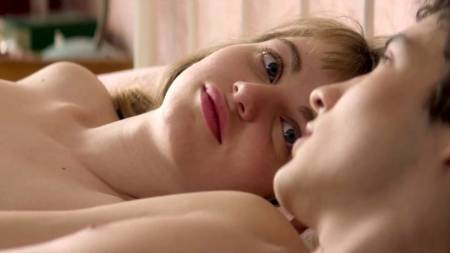
THE YOUNG ACTORS HAVE SOME VIVIS SEX SCENES
Last edited by Chris Knipp; 10-12-2015 at 08:41 PM.
-
Michael moore: Where to invade next (2015)
MICHAEL MOORE: WHERE TO INVADE NEXT (2015)
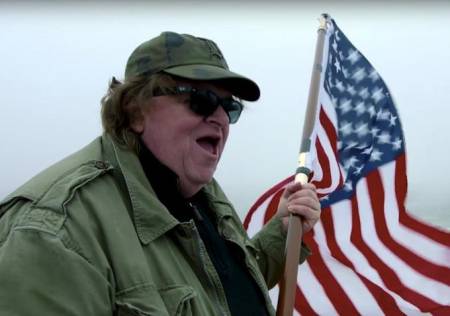
MICHAEL MOORE PLANTS HIS "INVASION" FLAG IN WHERE TO INVADE NEXT
Michael Moore goes on a world tour, seeking better ways of doing things than America's
For his first new film in six years Michael Moore, some think, has mellowed, and brought up his ever-present humorous side to greater prominence than previously. And this time he's not attacking the US, not exactly anyway. He's taking a more positive tack, going to other countries -- Italy, France, Finland, Slovenia, Germany, Portugal, Tunisia, Norway and Iceland -- focusing on particular ways of doing things in each country that America might do well to emulate. The concept is simple. When you travel, haven't you found in other countries certain things that were clearly done better there than at home? What if these superior features or places could be "invaded" and "stolen" to be brought back for home use?
Actually Moore does attack the US, right off, by describing an alleged meeting with top US military leaders and hearing them declare they've failed miserably. Later he points out the enormous percentage of our tax dollar that goes to "defense." But then, we go on a quirky world tour and see what Moor comes up with. This approach clearly goes back to the passages in Sicko where Moore discovered other nations -- most notably France --where health care is unmistakably more accessible and kinder than America's. This time, he frequently points out that the great situations abroad are recently achieved, and often hard-won.
In Italy he finds such kindness granted to workers. He interviews a cheerful middle class couple, and the managers of several factories, including the Ducati motorcycle company's. The information they give shows Italians get much more time off, including seven weeks of paid vacation, lengthy paid maternity leave, and a couple hours every working day to go home and have a full sit-down lunch with their families. The company owners are fully in favor of these conditions and they lead to employee satisfaction and more productivity.
In France Moore visits several (public) schools, showing how magnificently kids eat. They are served at table -- no plastic -- and the chef keeps dozens of different cheeses on hand. The menus are decided upon every month at a meeting of the chef and town officials. When Moore brings a can of Coca Cola to the table, the children decline to try it. The luncheon is looked upon as a class in nutrition and manners, and is not rushed. For older kids, Moore finds a humane and honest sex education program that means far fewer teenage pregnancies than Stateside.
In Finland they have abolished homework and avoid standardized, multiple-choice tests, resulting recently in having the best educational system in the world. In Slovenia, there's no college tuition -- and, as in a number of other countries, therefore no school loan debts carried on into one's thirties or forties. In Germany, Moore focuses on how students are taught the truth about their nation's terrible Nazi past, and speculates what it might be like if we in America taught and openly memorialized our nation's foundation on genocide and slavery. Throughout the film Moore shows videos illustrating how recent cruel abuse of black people still is here.
In subsequent country stops Moore finds far kinder prisons (a maximum sentence of 20 years even for the mass murderer) in Norway with a far lower recidivism rate; sentences to far-away jails for delinquent bankers in Iceland resulting in a quick recovery of the economy; and an awareness that women, lacking the selfishness caused by testosterone, may be more reliable leaders; legalization of drugs in Portugal avoiding the ravages of America's "war on drugs"; and a Tunisian woman who points out that there, and elsewhere, American cultural products are eagerly consumed, but Americans seem to have very little knowledge of other cultures.
One of Moore's most arresting assertions is that, given how the heavy and selective criminalization of drugs in America has led to the huge black criminal population used as a factory work force (for such as Victoria's Secret), in effect America's former enslavement of black people has been recreated in the modern era.
There is no overriding theme here, just a lot of enlightening details and the thesis that America needs to be able to adopt better ways that obviously work elsewhere. As with similar coverage in Sicko, Moore paints a simplistically positive picture of each country, eschewing contradictions and complexities. This is his way. And it works. Of course he is cherry-picking, but why not? Amid the frequent laughs, there is much that is moving and hopeful. We leave with the conviction that things can, indeed, get better.
Where to Invade Next, 110 mins., debuted at Toronto, and it was screened for this review as part of the New York Film Festival. Bought for distribution by a new label formed by two Weinstein defectors.
Watch NYFF press conference with Michael Moore here.
Last edited by Chris Knipp; 10-09-2015 at 07:55 PM.
-
STEVE JOBS (Danny Boyle 20150
DANNY BOYLE: STEVE JOBS (2015)
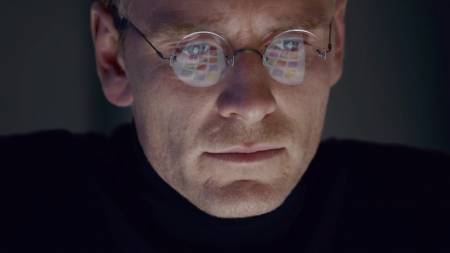
MICHAEL FASSBENDER IN STEVE JOBS
Jobs in pieces: a bold structure, but not the acid bath one had hoped for
Sorkin’s script for Danny Boyle’s Steve Jobs organizes all the action around three moments in the Apple mastermind's life. They are semi-realtime forty-minute segments before three of those big public presentations of products that were the arena in which Jobs honed his fame and, not always successfully, promoted products. They're at the Cupertino performing arts center, before the introduction of the Macintosh computer in 1984; at the San Francisco opera house before the introduction of the non-Apple NeXT black cube when Jobs had been expelled from Apple; and at Davies Symphony Hall in 1998 just before the launch of the iMac. Two non-successes, then the beginning of the Jobs triumphs when he returned to the company. Nothing is included about the later, greater triumphs or the the pancreatic cancer that took Jobs away at the height of his fame in his fifties.
Those expecting Sorkin's script to be a worthy followup to the dazzling displays of verbal sparring he's produced elsewhere, notably in David Fincher’s The Social Network, will be a bit disappointed -- though Jobs makes just as steely, mean, and brilliant a subject as Mark Zuckerberg, if not more so. Do Sorkin, Boyle, and the lead Michael Fassbender really give Jobs the "brilliant, maddening, ingeniously designed and monstrously self-aggrandizing movie he deserves," as Justin Chang wrote in Variety at the film's Telluride debut? That's nice rhetoric from Chang, but not quite lived up to.
We do get ample illustration of Jobs’ meanness toward his chief working partner and the original Apple presiding genius, Steve Wozniak (a warm and appealing Seth Rogan) and see how Jobs mistreated his ex-girlfriend Chrisann (a mousy Katherine Waterston) and long unacknowledged daughter, Lisa (played by two actresses, Mackenzie Moss and Perla Haney-Jardine). But the film chooses to end on an up note — a reconciliation between Jobs and his now nineteen-year-old daughter. It’s an awfully positive way to conclude the portrait of a cruel egomaniac. Oddly, it's the heartfelt emotional outbursts that dominate in Steve Jobs over the withering, mean putdowns.
True, Sorkin does (to quote Chang again) "blow away traditional storytelling conventions" (thankfully, for those of us suffering from advanced biopic fatigue) in the highly schematic way he presents the man, his talents, and his failures as a human. The screenplay is broken down into a stark, highly theatrical (and Birdman- like) framework that mixes the public and private personas, the business “genius” and the deeply flawed and chilly private person. Sorkin has brilliantly composed the backstage interactions, often involving his trademark walk-and-talk dialogues — so as to pack in a great deal of Jobs and Apple history in highly dramatic form. This is Sorkin’s forte: his dialogue is lively, idiomatic, idiosyncratic, but never fails in its aim to function as detailed exposition.
The way Jobs orders people around in the first segment amply shows off his imperiousness, and the fact that he was introducing the NeXT black Cube when it was not even yet functional shows his typical emphasis on façade over function. I was pleasantly surprised that Seth Rogan doesn't make his performance as Wozniak too jokey or cuddly. Rogen gets the most emotionally solid speeches, particularly one in which he points out Jobs could not even write code. How do you show an absent father? Apparently in enacting the rare times when he is present, because we see Jobs trying to show an interest in Lisa, saving her drawing on the Macintosh when she was six, and finally coming close to a hug, promising that he will certainly pay her Harvard tuition.
As John Scully, the former Pepsi honcho who was Apple CEO and got pushed out later, Jeff Daniels may be playing a role written expressly for him (he dominated the recent Sorkin TV series “The Newsroom”), and he arguably makes a warmer, more interesting character than the dull real-life Scully. It’s a somewhat odd choice to cut off each segment before Jobs’ onstage launch appearances, since those were the iconic Steve Jobs moments.
Things get pretty technical at times in the arguments about operating systems and computer adaptability: it’s likely older audience members may be lost at such times; but then, The Social Network didn't appeal to everybody either.
Fassbender, a brilliant actor, ably dominates the proceedings, his lack of resemblance to the real Jobs soon forgotten; but he needs a constant foil, and that is provided in each segment by Kate Winslet (doing an understated Eastern European accent) as Jobs’ continual sidekick and head of marketing Joanna Hoffman. Almost unrecognizable, Winslet is impressively fluid.
Chang is not wrong when he speaks of this film as "Straining like mad to be the Citizen Kane (or at least the Birdman) of larger-than-life techno-prophet biopics." There are touches of Kane and of Birdman; but "straining" is the operative word. True, this is a more stylish and interesting movie than Joshua Michael Stern's conventional biopic Jobs, starring Ashton Kutcher — though that film shows more vividly how nasty Jobs could be to Apple staff. A perusal of Jobs, Alex Gibney’s recent documentary Steve Jobs: The Man in the Machine, and the Walter Issacson biography will show you that, despite the somewhat chaotic collection of information Sorkin weaves into his script (and Boyle over-kinetically directs), a lot of the story is left out here. Most of all, after The Social Network -- and all the damning things I've recently learned about the man-- I was disappointed that Steve Jobs was not more of a portrait dipped in acid.
Previous Danny Boyle films include Shallow Grave, Trainspotting, The Beach, 28 Days Later, Sunshine, Slumdog Millionaire, and 127 hours. Steve Jobs includes Michael Stuhlbarg as Andy Hertzfeld. Writer Aaron Sorkin scripted the TV shows "The West Wing" and "The Newsroom" and the films A Few Good Men, The American President, Charlie Wilson's War, The Social Network, and Moneyball. Steve Jobs is based on the official biography by Walter Isaacson, which presents negative aspects of the man without ever ceasing to assume him to be a god of modern times. Sorkin selects for some of the key negative aspects, but with his kind ending, still winds up, as A.O. Scott put it in his NY Times review, "burnishing the reputation" of the man. When will we get the truly clear-eyed portrait that will show Mr. Jobs was not only not a nice man, but also not a god, even of cyberworld? But as long as the films are based on Isaacson's official biography, that's not going to happen.
Steve Jobs., 122 mins., debuted at Telluride; also at the London and New York Festivals. Reviewed as part of the New York Film Festival, where it was presented as the centerpiece film. Limited US theatrical release began 9 Oct. 2015.
Watch the NYFF post-screening press conference here.
Last edited by Chris Knipp; 10-10-2015 at 06:03 PM.
 Posting Permissions
Posting Permissions
- You may not post new threads
- You may not post replies
- You may not post attachments
- You may not edit your posts
-
Forum Rules





 Reply With Quote
Reply With Quote








Bookmarks